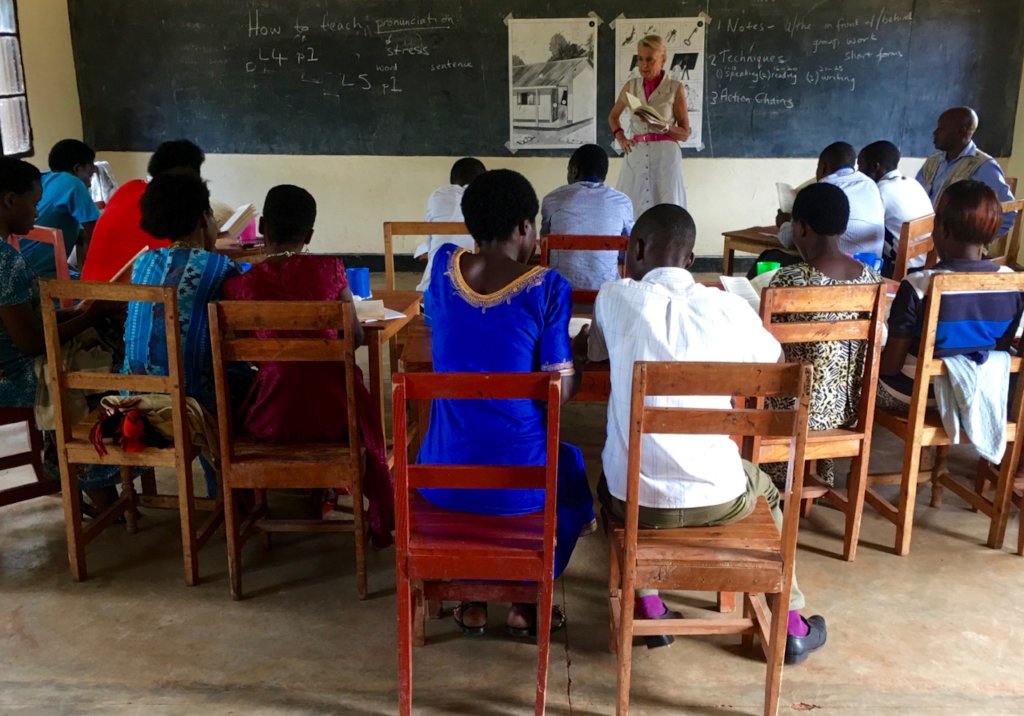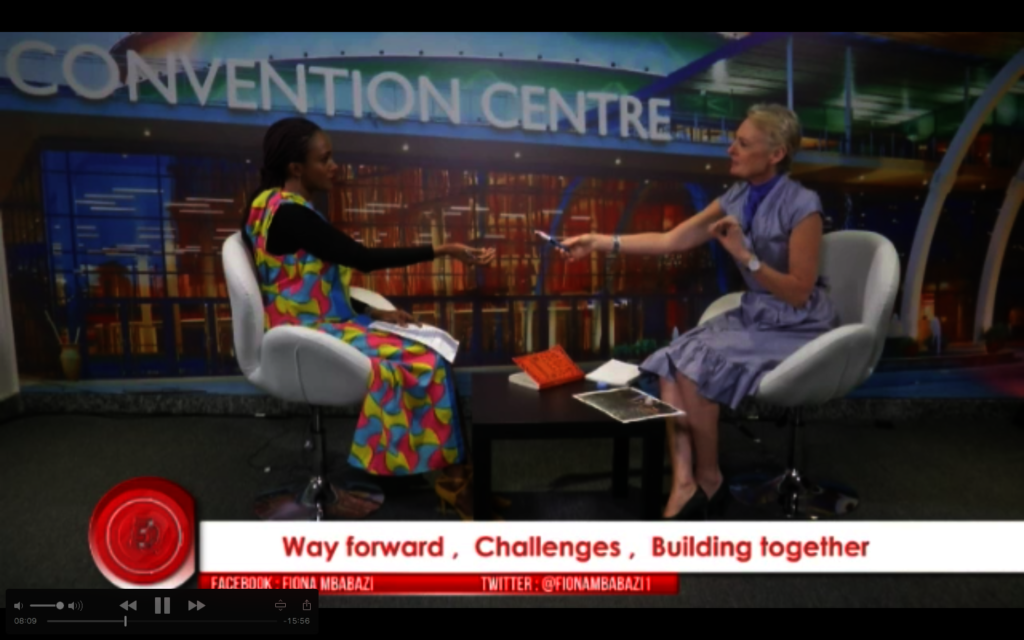By Katy Allen | Director
Education East Africa Quarterly Report
UPDATE FROM KIGALI
May 2018
Here we are with the first term of the school year over, the two-week holiday just finished and the second term underway.
The first term was interesting. At most of the schools where we work, the teachers who had taught English to Primary 1 last year followed their pupils into Primary 2. This has worked well as the teachers know exactly what the pupils learned last year. Some of last year’s Primary 1 English teachers stayed teaching in Primary 1 which also is working well as those teachers know the materials and hence have made a very good start with their pupils’ foundation in English. However, we also have new teachers. This has been a challenge. The new teachers in Primary 1 soon found their feet, but the new teachers of Primary 2 had a very difficult task of not knowing the material used last year, and yet having to assess their pupils’ knowledge and understanding. Another problem was the very long holiday the pupils had had since the end of the last school year at the beginning of November and the start of this school year on 22nd January. That meant that the pupils had not spoken English for nearly three months, and some had forgotten a lot!
Our materials are contained in the New Original English Course (NOEC) books. This is a course of five sets of books covering the six years of primary education. Each set of books has a Teacher’s Guide and a Pupil’s Book. The Teacher’s Guide is comprehensive with very full explanations and instructions for the teachers in their mother tongue of Kinyarwanda, and the English to deliver in each lesson, as well as answers to all exercises in the Pupil’s Books. As the teaching methods are within the body of the Teacher’s Guide and given in Kinyarwanda, the teachers can use the books effectively. We are there to provide guidance, and to assist with other matters such as classroom layout, classroom management, and encouragement to the teachers.
After a bit of a slow start with some of the Primary 2 English classes, lessons were soon underway with good teaching methods and the pupils learning and progressing. It was wonderful to see how the teachers who had used our materials last year helped the new teachers, and showed that their command and understanding of the teaching methods is now embedded.
Primary 2 have now started to read and write in English. Reading and writing skills in a second language are learned differently from those in the first language. However, those new language skills depend on a certain level of competence in the first language. The standard of writing in Kinyarwanda across all the schools is at a very low level. Some pupils form their letters incorrectly, for nearly all pupils their letters are of different sizes, they don’t write on the line, and they have no regard for rules of when to use large and small letters, and most worrying of all, their words have no spaces and so all letters continue with no spaces. So, to help the pupils to write English words is very difficult. It is not the English teacher’s job to teach the pupils how to write, but this is what we are having to guide our teachers to do. We have to find time to help the pupils to write neatly and properly. This is affecting the progress using the NOEC materials, but we hope that the pupils will benefit.
The teachers who have been using the NOEC materials for more than a year now are excelling in their teaching methods. They now understand the stages of a lesson, and how to keep the lesson flowing but with different and varied activities. I have observed lessons with more than fifty pupils and more than 90% of the pupils being ‘on task’ throughout the forty minute lesson. This is no mean feat, and it comes from the teacher’s understanding of how children learn and how to engage them with their materials.
The new teachers are doing very well, but they specifically asked if they could have a workshop on the use of the NOEC materials. The only time we had was on a Saturday, but the teachers were more than happy with that. We held the workshop on Saturday 24th March and seventeen of our teachers attended. We concentrated on how to introduce a new item of language, with the correct demonstration stage, how to convey the pronunciation, how to use stress, and the correct use of choral drilling and then work with groups and individuals. We also worked hard on the teaching of reading and writing. The teachers enjoyed it, and from their evaluation forms they felt they had gained knowledge and confidence.
The end of year examinations which the Primary 1 pupils sat in November 2017 had very good results. We set the same examination for some Primary 4 pupils in February 2018. The Primary 1 examinations had been oral, and the test we set for Primary 4 was written, but the questions were the same. In all our Primary 1 classes the average score was more than 68%. In the P4 classes, with very generous marking the top mark was 27% and the average score was 9%. This helps to prove our argument that the teaching and learning of English in primary schools using the standard textbooks is not working.
The other side of our work away from the classrooms, is advocating for change.
We have been trying to see the new Minister for Education but without success. He has been extremely busy and despite being in frequent touch with his private secretary we are still waiting for an appointment. Meanwhile, there has been a new Director General appointed at the Rwanda Education Board, and changes in five other key positions there. This is obviously a time of change, and it is crucial that our voice is heard.
I was asked by the Rwanda Broadcasting Authority to be on The Big Q which is a weekly interview programme covering topical issues on Rwanda Television. I was interviewed about our work in primary education and the teaching and learning of English. A video of the twenty-five minute programme can be found on the following link: https://vimeo.com/259470168. The programme was broadcast three times!
I have great hopes that our views and experience will be listened to, and will help to improve the primary education in Rwanda. This is ambitious, but we are doing what no-one else is doing; working in the classrooms with years of experience in East African primary schools and having a great impact which is evidenced beyond doubt by the pupils understanding and using English.
To everyone who is reading this, I thank you so much for your interest in our work, and for your generous donations that enable us to keep going, and for sharing my desire to make life better for children through education.
Summer is on its way and let’s hope everything blooms.
Katy Allen - Director
13th April 2018
Education is the Passport to a Self-Sustaining Life
https://www.educationeastafrica.org
Links:
By Katy Allen | Director
By Katy Allen | Director
Project reports on GlobalGiving are posted directly to globalgiving.org by Project Leaders as they are completed, generally every 3-4 months. To protect the integrity of these documents, GlobalGiving does not alter them; therefore you may find some language or formatting issues.
If you donate to this project or have donated to this project, you can receive an email when this project posts a report. You can also subscribe for reports without donating.
Support this important cause by creating a personalized fundraising page.
Start a Fundraiser
